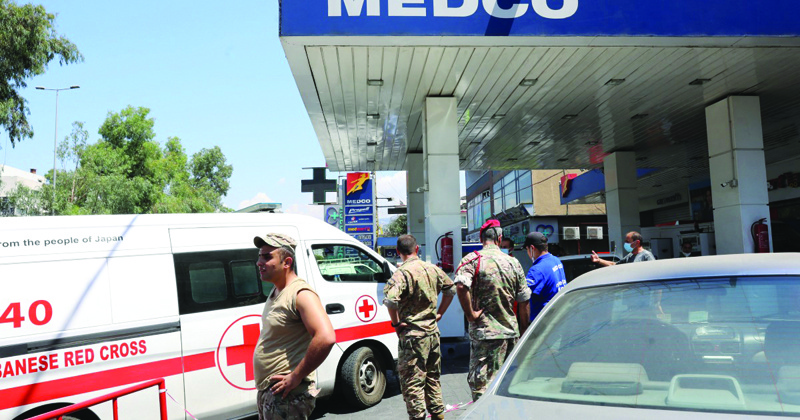 BEIRUT: Lebanon raised fuel prices yesterday in a de facto end to state subsidies, pushing the cost of filling a vehicle's tank to more than the monthly minimum wage in the poverty-stricken nation.
BEIRUT: Lebanon raised fuel prices yesterday in a de facto end to state subsidies, pushing the cost of filling a vehicle's tank to more than the monthly minimum wage in the poverty-stricken nation.BEIRUT: Lebanon raised fuel prices yesterday in a de facto end to state subsidies, pushing the cost of filling a vehicle's tank to more than the monthly minimum wage in the poverty-stricken nation. Subsidies were gradually phased out over the past few months to shore up diminishing foreign currency reserves at the central bank, which could no longer fund fuel imports.
A revised price list published by the energy ministry set the cost of 20 liters (5.3 gallons) of 95-octane petroleum at 302,700 Lebanese pounds, or around $15 at the black market rate. This is around five times the price of 61,100 pounds set at the end of June, adding to the economic pain in a country where power cuts are common and basic goods including medicine have become scarce. The revised price "marks a complete lifting of petroleum subsidies," Fadi Abou Chakra of the country's fuel distributors' association said.
"The fuel price hike will cause the cost of services to also increase, especially transportation," he added. The energy ministry on Wednesday also raised the price of diesel and cooking gas following a drop in the value of the Lebanese pound against the dollar on the black market. The nose-diving pound was selling for around 20,500 pounds to the greenback, its lowest value in months, money exchangers told AFP. An energy ministry official said that the "latest petroleum prices were calculated on the basis of a currency exchange rate of 20,000 pounds to the dollar as per a central bank request." The official spoke on the condition of anonymity because he is not authorized to comment on the issue.
The price increases have mostly erased massive queues at gas pumps that clogged streets across the country during the summer when importers and gas station owners severely rationed supply. To fill a medium-sized vehicle's tank, Lebanese would now have to pay more than the monthly minimum wage of 675,000 pounds, at a time when nearly 80 percent of the population is estimated to live below the poverty line. The International Monetary Fund and France are among creditors demanding an audit of the central bank as part of urgent reforms to unlock financial support for Lebanon. The World Bank has called the country's economic crisis one of the planet's worst since the mid-19th century.
A New York-based firm contracted by the Lebanese government is to resume its audit of the central bank today in line with creditors' demands, the Lebanese presidency and a top official said. The International Monetary Fund and France are among creditors demanding an audit of Banque du Liban as part of urgent reforms to unlock financial support to deal with an economic crisis branded by the World Bank as one of the planet's worst since the mid-19th century. The Alvarez & Marsal (A&M) auditing firm had launched an audit in September last year but was forced to pull out some two months later because the central bank failed to hand over necessary data.
Yesterday, President Michel Aoun met with A&M managing director James Daniell, who informed him that "the company will begin tomorrow its forensic financial audit of Lebanon's central bank after all arrangements were completed," the presidency said. Finance ministry official Georges Maarawi told AFP that the auditing firm "will have 12 weeks to collect information and draft a report," under the terms of its contract with the Lebanese government.
The contract with A&M was signed by Finance Minister Youssef Khalil last month only days after he took up his post. In December, parliament approved a bill that suspends banking secrecy laws for one year to allow for the forensic audit-which is widely seen as a necessary prelude to any agreement with the IMF over financial assistance. Maarawi, the finance ministry official, said that Lebanese authorities are currently holding "technical meetings" with the IMF, without elaborating. - AFP










